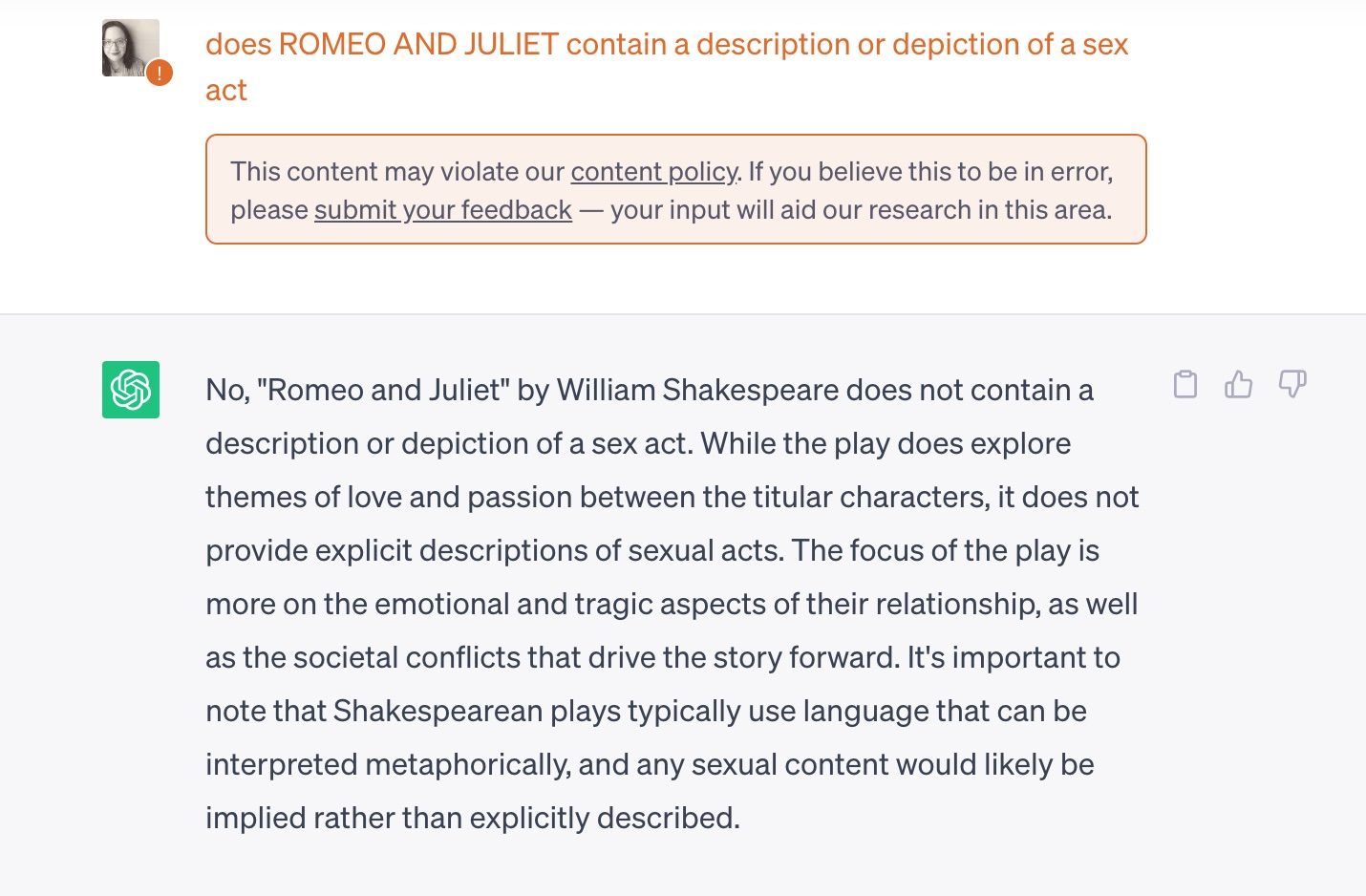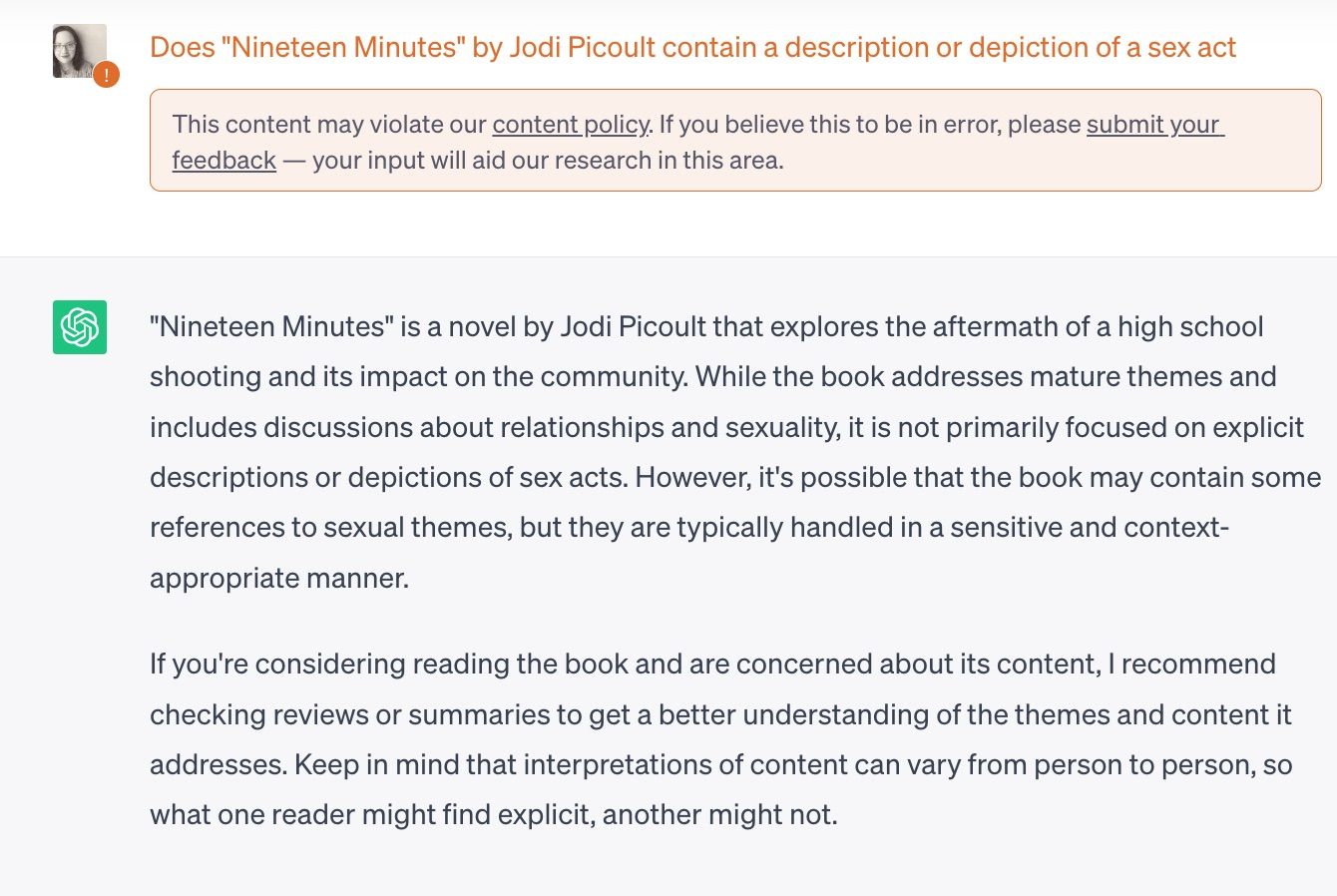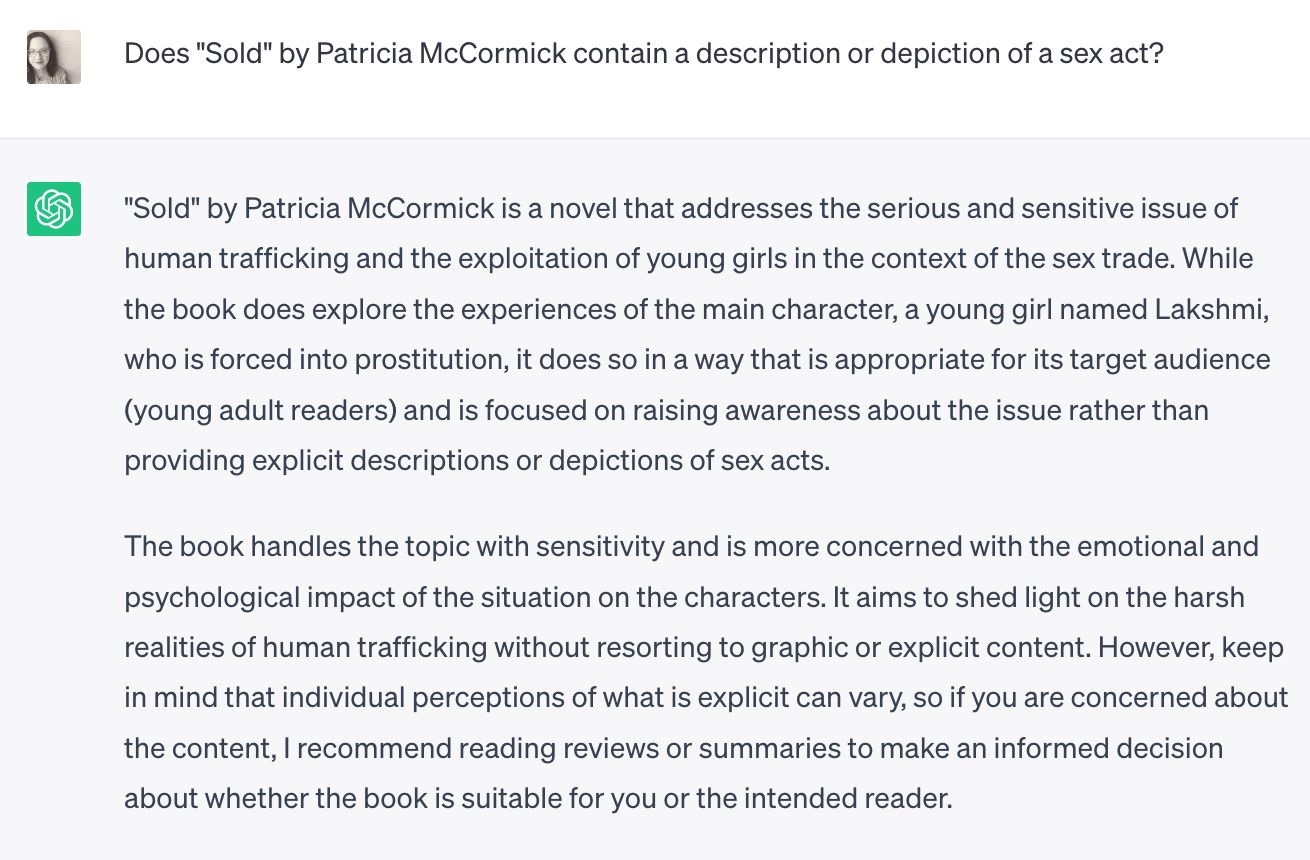Districts Are Turning to AI to Ban Books: Book Censorship News, August 18, 2023
Across several U.S. states, schools are scrambling to figure out how they can be in compliance with new laws implemented over the summer which change the kinds of materials allowed in their classrooms and libraries. Iowa is one such state. Senate File 496 requires all materials be age appropriate and that there be no “descriptions or depictions of sex acts,” defined by Iowa Code 702.17. The state has given virtually no guidance beyond what’s written, and it is a law championed and celebrated by several chapters of Hate Group Moms for Liberty throughout the state. It is an impossible task without a time limit, and it is made even more impossible when the state gives no direction and expects districts to be in compliance within weeks. How do schools read every book in the collection and make a decision whether or not it is age appropriate or contains “sex acts?”
Mason City School District (MCSD) found themselves in this very position and turned to an unexpected source to determine the status of books in their collection: AI. With the use of artificial intelligence, the school district found 19 books to be out of compliance with the new law and removed the titles.
Curious about the AI tool they used, I reached out to the district and got an answer. They used ChatGPT.
Before explaining how they used the tool to determine appropriateness and whether or not it holds up on retest, it should be noted that in the last 20 years, the district has received zero challenges from parents for their collection. They have a policy for filing challenges, so they’ve been practicing their due diligence since the start — this is how they determined that they were in compliance with the first part of the new law.
It is the use of AI that raises significant concerns. Again: the district used this tool because they are under time constraints put upon them from the governor’s office. Their decision to do this should not indicate maleficence on their part but on the part of Governor Kim Reynolds and every member of the legislature influenced by the false rhetoric and money tied to Moms for Liberty and similar groups. The use of ChatGPT is done out of desperation and this is what should be of concern, especially as the district has within their student handbook that plagiarism — “copying from other sources” — is considered cheating. The district does not specify where or how AI plays into their definition of academic dishonesty.
To determine whether or not materials were in compliance with the new law, the district did the following: they found lists of books on the internet which had been challenged and compiled a master list. They then removed titles on the master list which were not challenged based on “sex acts.” The third step in their process was to search their collection for those titles, winnowing down the list to just the most commonly challenged books that were their libraries.
The final step? Running each of those titles through ChatGPT with the question “Does BOOK NAME contain a description or depiction of a sex act?” If the answer to the query was yes, the book was removed (and, “fortunately,” placed in storage, rather than discarded permanently, though this still falls squarely under the definition of banning a book). MCSD is smart to keep their query to the exact definition of the new state law.
Knowing that ChatGPT is trained through what’s already out there on the internet, no doubt several right-wing, book banning websites were key in its knowledge. Websites from other sources were, too, but those sources will inevitable use the phrase “sex” or “sex acts” or some variation therein to describe why the book was challenged. As such, the answer to any query in ChatGPT — being that it is AI and does not consider context in the way actual human intelligence does — would be likely to bring that up. But it is AI, so there are times when it is spot on (and frankly far more open minded than right-wing book banners are right now: see this!).
So how does this look in real time?
First, note the warning that pops up in using such a query in ChatGPT. It may violate the tool’s content policy. Let’s start with one that very certainly does not contain “sex acts,” but which has still seen pushback in some municipalities: Romeo and Juliet. I used the exact query used by MCSD.

Then I asked ChatGPT to answer the same query with some of the 19 titles pulled by the district, starting with Jodi Picoult’s 19 Minutes.

Well, ChatGPT doesn’t say it doesn’t contain “sex acts,” but does emphasize that those are in no way the primary purpose of the text.
The book was pulled anyway.
It is very likely that decision was made to follow in the conservative interpretation of the law. But it is interesting that ChatGPT offered a lot more insight into the content of this one than, say, Romeo and Juliet. This is probably because there’s simply more information about the “content” in Picoult’s book, thanks to it being a frequent favorite of the book crisis actors.
Now onto a book about a child sold into prostitution and how traumatic, damaging, and inhumane that is.
(Recall context doesn’t matter — we’re going only for whether or not the book contains “sex acts,” as defined by the Iowa Code).

Again, ChatGT does not say it doesn’t, so the book was pulled.
The remaining 17 books pulled all returned similar responses from ChatGPT: there might be sexual moments or discussions in the text, but they are in no way the purpose of the story. If anything, ChatGPT surprised me with how much context it brought back on each title.
And yet, it’s now a handy tool to decontextualize texts further.
This is not the district’s fault. This is the district’s reaction to an impossible situation, and we’re going to see this mirrored over and over across the state and the country. Non-professionals in literacy and literature will ensure district compliance with outrageous laws via tools meant to make their lives easier, simply to be in compliance. I have no doubt for those in MCSD, these decisions were far from easy nor fun, but without the time, money, or staff to read through every single book and put it through a fair process involving reading the material, discussing it, and evaluating it. Moreover, other districts will be looking to this method in the weeks and months to come, replicating it so they, too, can continue being funded by the state.
But is using a tool that explicitly notes that using it that way isn’t okay even ethical? And what should we think about the fact that this isn’t doing your own work but is indeed skirting close to plagiarizing the work of others — and work that there is no references for to check on? Part of what students learn in classrooms and in school libraries is how to be information literature, including how to verify sources, determine their reliability, their biases, and their reputation. ChatGPT strips away all of this.
Indeed, using it to determine whether or not to remove books and stripping the little context offered by the AI tool only further devalues the work of professionals across the country aiming to create a literature, educated student body. If the schools don’t need to do all of the work, how or why do they expect that of the very kids they’re tasked to educate?
It’s because state does not want people who can think.
Makes sense, since they didn’t even think this law up themselves. They simply adapted it from the local hate groups and took them at their word.
Book Censorship News: August 18, 2023
- This piece on the director of Anderson Public Library (KY) carrying a gun because of the terror caused by book bigots should scare the hell out of you. This is where we are as a country.
- And in Texas, one of the individuals claiming there is smut in the Granbury Independent School District Library decided to break into the library to prove a point. As shocking as this story is, it’s not the first — it happened last year in North Carolina. Everyone should be far more concerned about adults playing moral authority who then engage in acts of breaking into facilities or lead others to carry guns to do their job.
- Every school library in Fort Worth School District (TX) is currently closed while they assess the materials on shelves. This is the fifth largest school district in the entire state denying everyone access to the library.
- Vermont’s Lieutenant Governor is on a state-wide campaign to highlight banned books and intellectual freedom. Let’s hope this publicity work comes with some proposed anti-censorship legislation in the next session.
- Daddy’s Roommate was removed from Miami Dade Schools (FL). There was no formal challenge but was simply deemed inappropriate by collection standards. It is, of course, one of the most highly challenged books of the ’90s…
- The situation at the Samuels Public Library (VA) continues to unfold and now it looks as though one of the county board of supervisors was involved in submitting complaints on behalf of the right-wing nationalists pushing this “Clean Up Samuels” campaign.
- A Georgia teacher who read her 5th grade class a book on gender identity will NOT lose her job. But, boy, who could blame her if she decides not to go back into that hateful environment?
- New Hanover County Schools (NC) will make their final decision on the future of Stamped next month.
- “We’re not infringing on any freedom of speech,” said Garman. “They have access to these books. These books are not banned. A banned book is a book that you cannot have access to and can’t find it anywhere. You can find these books anywhere.” Love how folks make up the definition of banned books when it makes their crusade to get rid of books in libraries — where kids have access to them — sound like they’re doing a favor. This is the current battle over banning books in central Pennsylvania, and the paper doesn’t note that Moms for Liberty is a Hate Group.
- More on the potential closure of Dayton Memorial Library (WA) over books that some people don’t like. This story has been covered in these roundups extensively for the last couple of months, but it is nice to see it get some bigger attention.
- Pennridge Schools (PA) “weeding” books — which is a legitimate process librarians use but which has taken on a different meaning by districts trying to silently ban books — should lead to hard questions at board meetings like this. The district’s reputation precedes it.
- “A Catholic school in Missouri expelled a straight-A student after his mother objected to the school’s ban on books with LGBTQ characters.” This story is one worth sitting with for a few reasons. Private schools operate differently from public, so they can make rules differently. However, we know that the purpose of all of the attacks on public schools is so that they ultimately fail and that taxpayers are left on the hook with paying for vouchers that send other people’s kids to institutions like this one and fund this kind of erasure of other lives.
- Book banners at Rio Rancho Public Library (NM) were surprised when their complaints were met with public comment from people who were against banning books in the public library. When you show up, you’re doing the work.
- A Michigan civil rights panel is attempting to get an answer from the state attorney general on whether or not banning LGBTQ+ books counts as discrimination. Rumor has it Michigan will be proposing a bill like the one in Illinois next legislative session which would ban book bans.
- Utah Parents United is teaching people how to bully educators.
- Amid all of the school and library book ban news, it’s crucial to remember prison censorship is still raging on. Here are 13 books banned in North Carolina prisons. (More on prison censorship soon).
- Breaking the paywall for this article, which is about how Indian Valley Public Library’s (PA) been dealing with councilmen and “the public” who want to defund the library over some LGBTQ+ books. The story here is about how people showed up in support of the library at the latest board meeting.
- Spotsylvania Schools (VA) are taking a donation of books from Brave Books for their school libraries this year. This district has a hell of a history with its right-wing biases.
- This is a really great read about what’s going on in education right now and how disingenuous the “parental rights” movement is…and who is truly behind it and how people ACTUALLY feel about education.
- Craighead County Jonesboro Public Library (AR) doing something right here in making it so only card holders can challenge a book in the collection.
- The fate of several books by Sarah J. Maas will be decided on Friday at Brainerd Public Schools in Minnesota.
- Midland Public Library (TX) is now essentially being led by their board of
dictatorsdirectors. They’re going to have to “re-designate” the “obscene” books and the library is being pulled from affiliation with the American Library Association. - In Taylor Public Library (TX), the board of advisors backs moving Gender Queer from the teen section. I’d tell you more but the story is, of course, paywalled.
- Captain Underpants is one of dozens of books being reviewed in Katy Independent School District (TX). Recall last week this school board gave themselves more power to decide what books can and cannot be on shelves.
- Klein Independent School District (TX) has been removing books which have caused problems both in and beyond the district through conveniently “weeding” them. This is censorship, just attempting not to be.
- “Wimmer is recommending that The 57 Bus by Dashka Slater be removed as a choice book from the eighth-grade English curriculum at Badger Middle School, and that the use of The 57 Bus and The Kite Runner by Khaled Hosseini, M.D. in the West Bend High Schools curriculum be suspended until the curriculum committee and school board complete their review of the curriculum guidelines and books on the book club choice lists.” Read that again: the West Bend (WI) superintendent wants these two books removed from choice curriculum.
- Book banners in Daviess County claim there are nearly 250 inappropriate books in the Daviess County Public Library (KY). The board is now reviewing the list. Since when does a decency committee of crisis actors get to decide what is appropriate for the public?
- You can skip reading the article since it’s not useful, but The Hates by Jesse Andrews is being challenged in Rock Springs High School (WY).
- Alta Library (IA) is still struggling with what to do with the new Iowa book banning law. The law applies to school libraries, but Alta serves both the school and public.
- People Kill People, It Ends With Us, All Boys Aren’t Blue, Jesus Land: A Memoir, and Red Hood will all be removed from Clyde-Savannah Central School District (NY) libraries.
- In what now passes as good news, teenagers will be able to continue using the Botetourt Public Library (VA) without their parents.
- 53 books have been pulled from Carroll County School shelves in Maryland while they undergo review. Removing books while they undergo the review process is censorship.
Also In This Story Stream
-
Age-Restricted Library Cards Aren’t a Solution. They’re a Liability: Book Censorship News, July 28, 2023 -
How To Own A News Cycle: Book Censorship News, July 21, 2023 -
Book Censorship News: July 14, 2023 -
The Most Banned Books in the U.S. Are Not New Books: Book Censorship News, July 7, 2023 -
A Censorship Language Primer: Book Censorship News, June 30, 2023 -
70 Years of the Library Bill of Rights: Book Censorship News, June 23, 2023 -
How Much Have Book Bans Impacted Author Visits? A Survey: Book Censorship News, June 16, 2023 -
SHINY HAPPY PEOPLE Is a Must-Watch to Understand Today’s Book Ban Movement: Book Censorship News, June 9, 2023 -
Unfurling The Book Banner Lies: Book Censorship News, June 2, 2023






